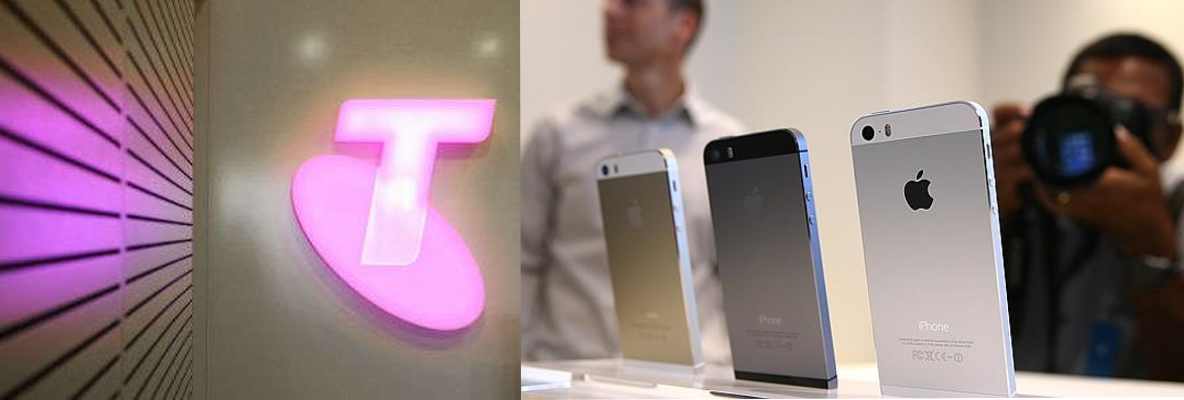
Apple shares jumped another 1%+ last Thursday, and ended the week at US$127, or a market capitalisation of $US740 billion, which is a record high for any company ever.
What drove the company higher was the fact that Carl Icahn, the activist shareholder, published a letter saying the company was cheap. He demanded an increased buyback by Apple of its “dramatically undervalued shares”.
In his letter he wrote that the shares were worth $US216 each, and he holds a position worth around $US6.5 billion. If he gets his wish, Apple would be worth $US1.26 trillion.
Is Apple cheap as Icahn says? Well, if the results produced by Telstra yesterday morning are anything to go on, quite possibly. On enterprise value multiples (market capitalisation adjusted for cash/earnings before interest and taxation), Apple is at a whopping 31 per cent discount to the Australian telco.
Apple’s enterprise value multiple is 9.9x, while Telstra is on 14.3x.Apple’s enterprise value multiple is 9.9x, while Telstra is on 14.3x. Telstra has net debt of $10 billion. Apple has net cash of $US144 billion.
Normally, shareholders pay more for higher growth, but Telstra’s growth at the earnings before interest, taxation, depreciation and amortisation line was just 0.5 per cent for the December half at $5.3 billion, while Apple reported operating income growth of 38 per cent to $US24 billion.
The only significant division of Telstra to report growth above 5 per cent was mobile, for which revenue grew 9.6 per cent, and it was this growth that powered the whole company’s performance. Without it, Telstra would be in run-off, with falling fixed-line revenues (minus 1.7 per cent) in the December half (a number which includes the growth of data, which effectively offset most of the fall in voice revenue).
Compare this with Apple. Its growth is also in mobile – phones, that is. In the quarter just passed, that amounted to 74.5 million units sold, an increase of 46 per cent. For the whole company revenue growth was 31 per cent to $US74.5 billion. For the quarter it increased net earnings 38 per cent to $US18 billion – or $US200 million a day, every day, the largest quarterly profit ever.
For a company of Apple’s size to increase earnings by 38 per cent is frankly almost unthinkable. And yet it did.
For the record, CEO Tim Cook also gave a presentation on Wednesday at one of the big investor conferences at which he said the company is selling every new iPhone 6 it can make. He said that the Apple Pay rollout is “going faster than I thought it would, much faster”.
There are numbers floating around to the effect that around two-thirds of all contact-less transactions of the three major credit cards in the US use Apple Pay. McDonalds has said the platform accounted for half of its paywave transactions in November.
And the next big launch, the Apple watch, is still two months away. Cook said the watch will be a game-changing product. “The customisable nature of the Apple Watch is incredible.”
The differences between Telstra and Apple in earnings growth, and the price the market pays for that growth could not be more stark.
Of course, Apple doesn’t pay the kind of dividend that Telstra pays. But students of finance know the truth behind this. Dividends are a zero sum game – if the company pays a dividend, great. If it doesn’t, the ‘dividend’ stays in the company – which you still own.
Icahn’s valuation is predicated on earnings per share of $US9.70 a share, which is less than 10 per cent higher than consensus numbers if the “real cash earnings” tax rate of 20 per cent is used, rather than the 26 per cent effective rate (which is based on lower taxes rates on unremitted foreign earnings).
The reality for Australian investors is that the world continues to globalise. Valuation anomalies such as Telstra and Apple ultimately get arbitraged out in a market where capital, too, is mobile. There are fewer and fewer places to hide. Which is good news for Icahn.
Australia’s $7bn data centre | Harry Morrow features in SBS On the Money
18 Dec 2025Anshu Sharma features on EquityMates Best of the Best Podcast
18 Dec 2025Share this Post

